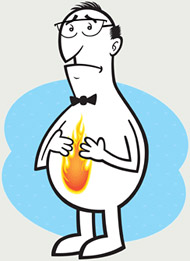Tips for maintaining a healthy digestive system
Posted in General Health & Wellness on May 11 2012. Last modified on March 28, 2019. Read disclaimer.
Heartburn, flatulence, nausea, constipation, diarrhea, belching, bloating... these are all fairly routine, albeit embarrassing, signs of digestive disturbances. Most often, the causes are temporary and little more than inconvenient, brought on or made worse by:
- stress
- fatigue
- eating too fast
- eating something for which our body is not well-suited
- bacteria-infected food
- illness, such as influenza
- menstruation or pregnancy
When symptoms are more severe, however, a visit to your doctor may be merited. Such symptoms may include:
- blood in the stool
- changes in bowel habits
- unexplained weight loss
- extreme abdominal pain
- heartburn that is not relieved by antacids
+ Free Shipping & Returns on Eligible Items.
(*Amazon's Top 100 list updated hourly.)
The human digestion process in a nutshell
Digestion (converting food into the nutrients needed to build, nourish and energize our cells) begins with the mouth. By chewing foods, we increase their overall surface area, making it easier for them to be swallowed as well as broken down by digestive enzymes, including one that's occurs already in our saliva. From there, chewed food passes quickly through the esophagus to the stomach, where muscle action and strong gastric acids work for a few hours with even more enzymes to continue breaking down the food. Next in the process comes the small intestines, where the majority of digestion and absorption occurs. From there, primarily the wastes head to the large intestines, while nutrients are directed to the liver where they're converted into chemicals that are needed to nourish our body.
Other organs involved in producing, storing or secreting digestive juices include the pancreas, gallbladder and even parts of the nervous and circulatory system. It can take from 24-72 hours for a meal to pass through the complete digestive system -- depending on the individual, what was eaten and the size of the meal.
General tips for maintaining healthy digestion include:
- Eat a healthy diet, including plenty of fiber which can be found in fruit, whole grain products and vegetables.
- Stay hydrated by drinking plenty of water.
- Don't smoke.
- If you drink alcohol, do so only in moderation since alcohol abuse is the greatest risk factor for developing digestive problems.
- Maintain a healthy body weight.
- Get regular exercise.
- Limit your stress.
- Avoid foods that may disagree with you. Common offenders often include chocolate, caffeine and carbonated beverages. In addition, since specific enzymes are required in order to digest certain foods, problems such as lactose intolerance and celiac disease (allergy to gluten found in many grain products) can result if your body is lacking in certain enzymes.
- Be conscious of how certain medications may effect your digestion process.
- Avoid overeating. One tip for accomplishing this is to eat slowly and chew your food well. Not only may this make you feel fuller, it may also help your energy level.
- If you need to go to the bathroom -- go. Waiting can increase your chances of getting constipated.
- Keep your hands clean, to remove germs which may cause diarrhea.
Sources (Accessed May 11, 2012)
http://www.womenshealth.gov/publications/our-publications/the-healthy-woman/digestive_health.pdf
http://www.nlm.nih.gov/medlineplus/digestivediseases.html#cat5
http://patients.gi.org/topics/digestive-health-tips/
http://www.mayoclinic.com/health/digestive-system/DG00021
http://www.mayoclinic.com/health/digestive-system/AN00896
http://ed.fnal.gov/arise/guides/bio/8-Body-Systems/8a1-DigestionDigestiveEnzymeLabII.pdf
http://www.newton.dep.anl.gov/askasci/gen01/gen01179.htm
http://kidshealth.org/kid/htbw/digestive_system.html
http://digestive.niddk.nih.gov/ddiseases/pubs/yrdd/

 Finding healthy, loving, adult relationships
Finding healthy, loving, adult relationships 6 Tips for staying motivated
6 Tips for staying motivated Why we should all be eating onions and garlic
Why we should all be eating onions and garlic How to stop hiccups
How to stop hiccups How to get the best treatment from your doctor
How to get the best treatment from your doctor Guarding against ticks and diseases they carry
Guarding against ticks and diseases they carry Safety tips for playground activities
Safety tips for playground activities Networking ideas for single parents
Networking ideas for single parents Single parent support resources
Single parent support resources Why it's never too late to stop smoking
Why it's never too late to stop smoking Controlling gas, constipation, and heartburn
Controlling gas, constipation, and heartburn